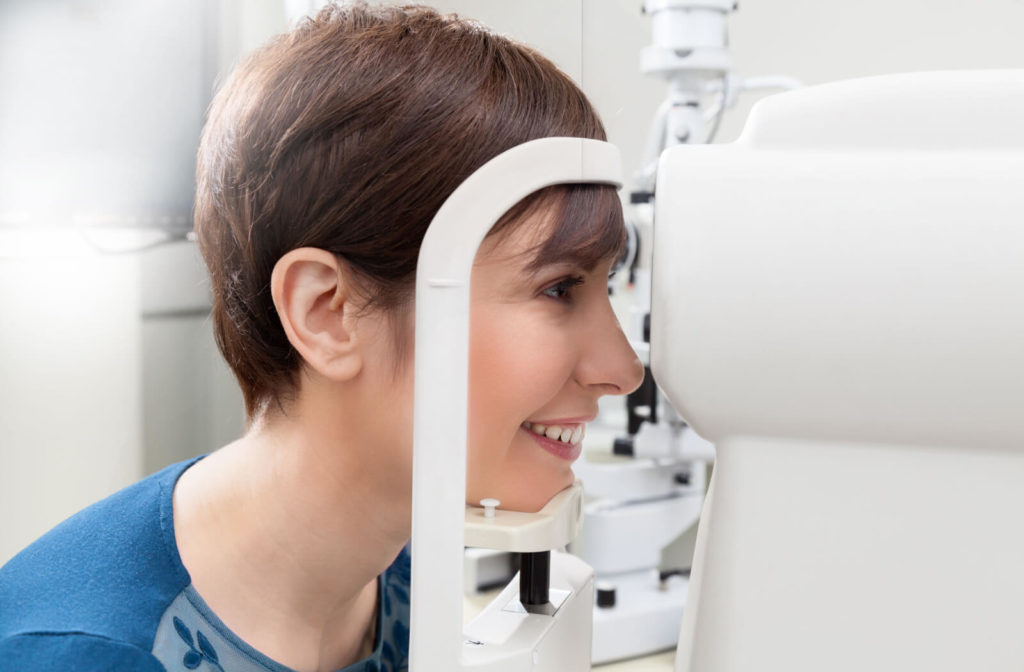Routine eye exams are important for maintaining your ocular health and allow your doctor to check for symptoms or issues that might develop into more serious issues down the line.
Pre-testing is typically performed before you meet with your optometrist to collect basic information about your vision. Afterward, your optometrist can use the information gathered to help with the complete eye exam.
If you need to book your next eye exam, contact our friendly staff at Pacific EyeCare Optometry to schedule an appointment.
What Is Pre-Testing?
Pre-testing typically involves simple tests or questions to gather basic information about your eyes and vision. Here are some questions you might be asked during a preliminary examination:
- Are you experiencing any discomfort?
- Have you noticed any eye problems?
- Are you taking any kind of medication?
- Have you had any previous health issues?
- Are you allergic to any medications?
- Do you have a family history of eye disease?
Following some general questions, you may be asked to complete one or more of the following tests:
Auto-Refraction
An autorefractor is a machine that measures your eye’s refractive errors. It can help to identify nearsightedness, farsightedness, or astigmatism. The results of the test help provide a baseline prescription for your eyes.
Aberrometry
Aberrometry uses wavefront technology to detect vision errors based on how light travels through your eye. It is another tool that can be used to help determine your eyeglass prescription.

What Happens During an Eye Exam?
After pre-testing, your optometrist will likely conduct a complete eye examination to determine your ocular health and check for potential issues. Here are a few of the tests you may expect to receive during an exam:
Eye Muscle Test
An eye muscle test is done to watch your eye movement and determine your overall muscle control. Your doctor may use a pen or light exam to read your eye’s movement.
Visual Acuity Test
A visual acuity test measures the clarity of your vision. In this exam, your eyes are generally tested separately. The doctor will ask you to read from a chart or screen with letters of the alphabet in various sizes.
Color Vision Testing
Color vision testing can be done using a multicolored dot-pattern test. Your doctor may ask that you look at an image of colored dots with a number or letter in the center made of different colored dots. If you can see the numbers or letters, you likely don’t have color vision issues.
Refraction Assessment
A refraction assessment may happen through retinoscopy, which entails projecting a beam of light into the eye and observing the movement reflected in the back of the eye.
Visual Field Test
Visual field testing is important for determining if there are any issues in your overall field of vision. Some types of visual field tests include the confrontation exam, manual testing, or automated perimetry.
Slit-Lamp Examination
A slit lamp is used to help your doctor to examine your eyelids, lashes, cornea, and other structures at the front and inside your eye.
Ultrasound
Sometimes, your doctor will recommend an ultrasound to check for any abnormalities or signs of cataracts, tumors, or bleeding in the eye.
How Often Should You Get an Eye Exam?
At Pacific EyeCare Optometry, we recommend booking a comprehensive eye exam every year if you are a new patient or are at risk of ocular-related problems.
After learning more about your vision and ocular health, we may recommend decreasing or increasing the frequency of your exams.
How to Take Care of Your Eyes
Booking a routine eye exam is not the only way to take care of your eyes; there are many things you can do at home to take care of your ocular health.
- Maintain a healthy and well-balanced diet of fruits, vegetables, meats, and omega-3 fatty acids.
- Exercise regularly and maintain a healthy weight, as diabetes, high cholesterol, and high blood pressure can affect your eyes.
- Wear sunglasses when outside in the sun or blue light glasses when spending time in front of a digital screen.
- Understand your family’s medical history and if you are at risk of eye problems.
- Trying to avoid smoking or being around others that are smoking.
Your eyes are one of the most important parts of your body, and it is vital to actively watch out and take care of your visual health. Don’t hesitate to contact our team at Pacific EyeCare Optometry if you have questions about your eye health.
Visit Us at Pacific EyeCare Optometry
If you are feeling any eye-related symptoms or it’s time for your annual eye exam, please book an appointment with our friendly staff today.



